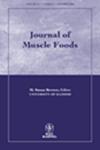TENDERIZING AND PRESERVING YAK MEAT BY GINGER EXTRACT (ZINGIBER OFFICINALE ROSE)
Abstract
ABSTRACT
This study was conducted to develop a method for improving tenderness and inhibiting oxidative change of yak meat by ginger extract (GE) treatment. Uniform-sized 3 cm × 3 cm × 3 cm yak meat chunks (Longissimus dorsi muscles) were marinated with distilled water, 3%, 5%, 7% GE and 0.2% sodium ascorbate, respectively. The samples stored for 24 h, 48 h and 72 h, and 3, 5, 7, 9 and 11 days at 4C ± 1C. The shear force values and cooking yield of the GE-treated samples were compared with that of the control groups, and thiobarbituric acid reactive substance (TBARS) value was compared with both the control group and the 0.2% sodium ascorbate-treated group. Significantly lower shear force values and TBARS value (P < 0.05) were observed in all the GE treatment samples, and the sodium ascorbate-treated group has similar TBARS with that of the 0.3% GE group. Cooking yields were also significantly higher in the GE-treated samples than that of the control groups (P < 0.05). Scanning electron microscope photos clearly depicted the extensively broken and swollen muscle fibers in the GE-treated samples. The results indicated that 5% (v/w) GE can be effectively utilized to tenderize tough yak meat and prevent yak meat from oxidation during storage.
PRACTICAL APPLICATIONS
Yak meat is an important protein resource for the Tibetan people, but yak meat was tougher and sensitive to oxidative change. This research would have practical applications to the yak meat processing and preservation. It can be applied at the industrial and household level as an easy method to improve yak meat quality and prevent yak meat from oxidation during storage.

 求助内容:
求助内容: 应助结果提醒方式:
应助结果提醒方式:


